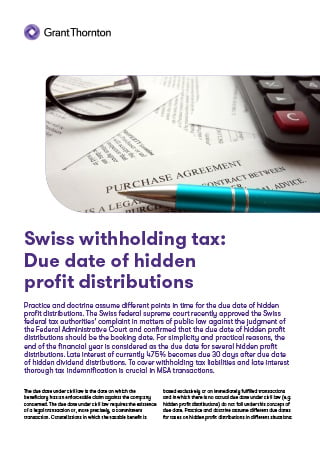-
Audit Industry, Services, Institutions
More security, more trust: Audit services for national and international business clients
-
Audit Financial Services
More security, more trust: Audit services for banks and other financial companies
-
Corporate Tax
National and international tax consulting and planning
-
Individual Tax
Individual Tax
-
Indirect Tax/VAT
Our services in the area of value-added tax
-
Transfer Pricing
Our transfer pricing services.
-
M&A Tax
Advice throughout the transaction and deal cycle
-
Tax Financial Services
Our tax services for financial service providers.
-
Advisory IT & Digitalisation
Generating security with IT.
-
Forensic Services
Nowadays, the investigation of criminal offences in companies increasingly involves digital data and entire IT systems.
-
Regulatory & Compliance Financial Services
Advisory services in financial market law and sustainable finance.
-
Mergers & Acquisitions / Transaction Services
Successfully handling transactions with good advice.
-
Legal Services
Experts in commercial law.
-
Trust Services
We are there for you.
-
Business Risk Services
Sustainable growth for your company.
-
IFRS Services
Die Rechnungslegung nach den International Financial Reporting Standards (IFRS) und die Finanzberichterstattung stehen ständig vor neuen Herausforderungen durch Gesetzgeber, Regulierungsbehörden und Gremien. Einige IFRS-Rechnungslegungsthemen sind so komplex, dass sie generell schwer zu handhaben sind.
-
Abacus
Grant Thornton Switzerland Liechtenstein has been an official sales partner of Abacus Business Software since 2020.
-
Accounting Services
We keep accounts for you.
-
Payroll Services
Leave your payroll accounting to us.
-
Real Estate Management
Leave the management of your real estate to us.
-
Apprentices
Career with an apprenticeship?!

The due date under civil law is the date on which the beneficiary has an enforceable claim against the company concerned. The due date under civil law requires the existence of a legal transaction or, more precisely, a commitment transaction. Constellations in which the taxable benefit is based exclusively or on immediately fulfilled transactions and in which there is no actual due date under civil law (e.g. hidden profit distributions) do not fall under this concept of due date. Practice and doctrine assume different due dates for taxes on hidden profit distributions in different situations:
- Due date at the time of performance or booking: Hidden profit distributions or “other types of non-cash benefits” are usually not based on a legally binding transaction, but are purely factual transactions, whereby the taxable benefit is based on (immediately) fulfilled transactions and there is (possibly) no actual due date under civil law. In these cases, the withholding tax claim arises at the time of performance or – in the case of the accounting disclosure – at the time of the respective booking of the hidden profit distribution.
- Due date at the end of the financial year: In certain circumstances, it may be justifiable to use the end of the financial year as the due date for a hidden profit distribution. On the one hand, this applies to situations in which no date of performance can be determined from the accounting records. On the other hand, the end of the fiscal year is considered decisive – in the interest of practicability – even if the date of performance is known, if many different payments of the same type have been made to a recipient during a tax year.
- Due date upon approval of the annual financial statement: Even 50 years ago, the doctrine stated that the link to the point in time of the approval of the annual financial statement should be regarded as a clear exception only and, for practical reasons, as the latest point in time at which a hidden profit distribution is made.
- Due date in the event of (attempted) tax evasion: Finally, with regard to the start of the limitation period in the event of (attempted) tax evasion, the question of the due date must be considered in a differentiated way. In line with the nature of the withholding tax as a self-assessment tax, the point in time at which the company violated its declaration obligation is to be used as the due date for the commission of the offense. This is the day on which the company submitted its annual financial statements in which the hidden profit distribution is not recorded. The limitation period begins on the following day. If the company does not submit annual financial statements to the Swiss federal tax authorities, the start of the limitation period under administrative criminal law is to be based on the expiration of the 30-day declaration period under the Swiss withholding tax ordinance. If the company does not hold a general meeting at which the annual financial statements could be approved, the limitation period begins 30 days after the latest date for the ordinary general meeting which is six months after the end of the financial year.
The case at hand concerns the determination of the due date with regard to the start of the late interest liability of various hidden profit distributions made in the course of different financial years. These payments are not based on a legally binding transaction, but are mere acts of disposal, purely factual acts. Accordingly, the corresponding withholding tax claims arise in accordance with the Swiss withholding tax ordinance at the time of the respective individual bookings. Contrary to the Swiss Federal Administrative Court, there are no apparent reasons to base the decision on the approval of the annual financial statements and not to assume the time of the effective payment of the hidden profit distribution. For simplicity and practical reasons, the end of the financial year was considered as the due date for these hidden profit distributions and the Swiss withholding tax liability was due 30 days later which was the trigger date for calculating late interest (i.e. as of January 31).
Thus, it is key that buyers of a Swiss target company carefully negotiate representations and warranties as well as indemnification clauses and their limitations in the share purchase agreement.
Grant Thornton Switzerland is well-positioned and has indepth knowledge and experience in advising throughout the transaction and deal cycle, including negotiation of share purchase agreements.


